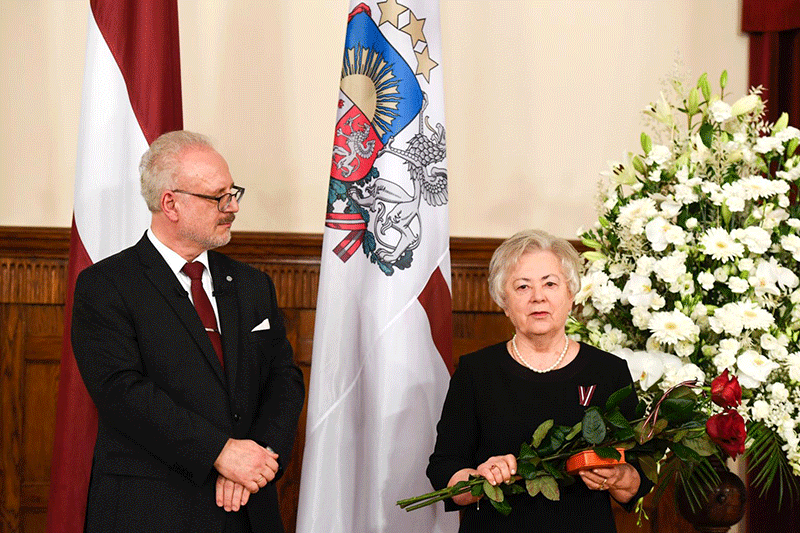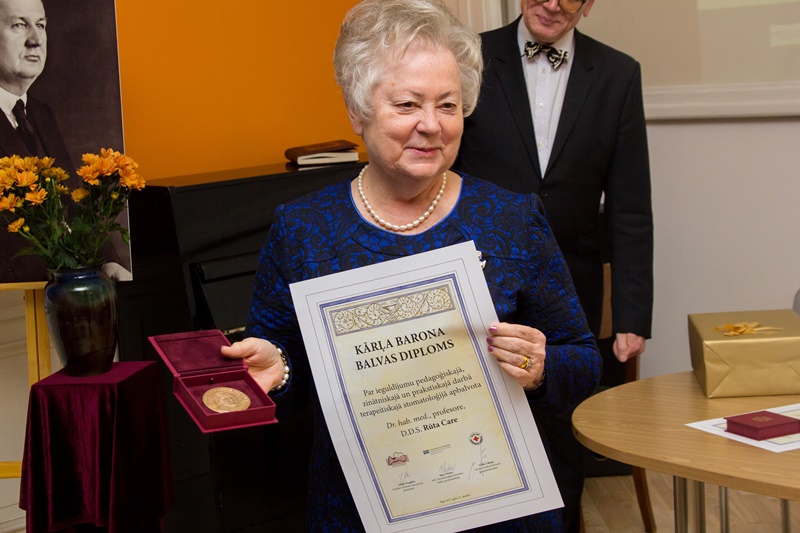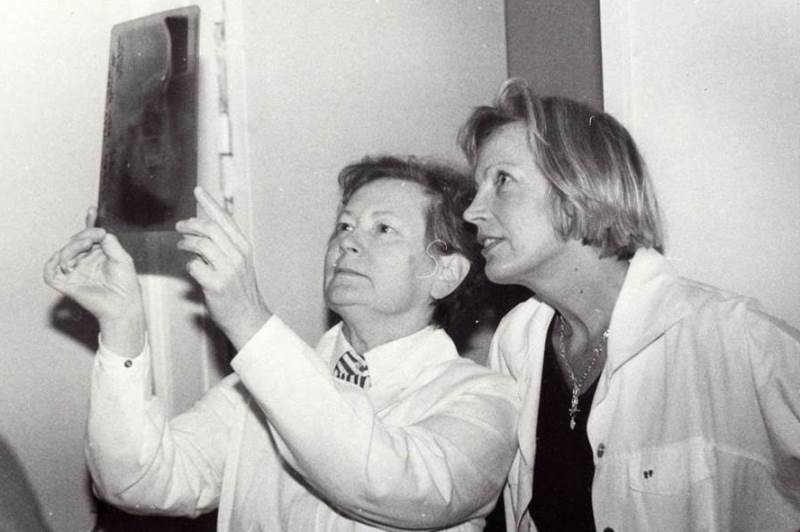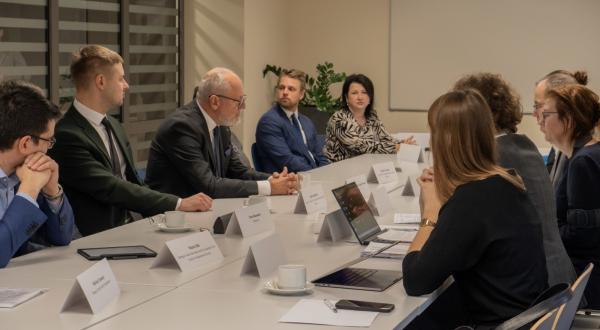RSU Prof. Rūta Care: Dentistry is My Life's Calling
How did a girl from the countryside in Mazsalaca become an outstanding dentist, professor and long-standing head of the Department of Conservative Dentistry and Oral Health at the Faculty of Dentistry of Riga Stradiņš University (RSU) as well as a recipient of the Cross of Recognition for her contribution to research and development in dentistry? We asked Prof. Rūta Care about what led her to where she is, what difficulties she's overcome, what traits a dentist needs and whether she has always had luck by her side.
From the left: President of Latvia Egils Levits and Prof. Rūta Care, long-time Head of the Department of Conservative Dentistry and Oral Health at the Faculty of Dentistry of RSU. 18 November 2019. Photo: Ilmārs Znotiņš, Chancery of the President of Latvia.
You have been the Head of the Department of Conservative Dentistry and Oral Health at the Faculty of Dentistry for 17 years: from 1993, when Latvia had just restored its independence and Western experience was gradually trickling through, to 2011, when Latvia was a fully-fledged member of democratic Europe. Which challenges do you remember most vividly?
The beginning was difficult. The curtain to the West was being lifted when I had just started as Head of the department and we could see how much we had fallen behind. Our equipment and technologies were obsolete. When representatives from the World Health Organisation came to evaluate our facilities they concluded that our equipment was dangerous. We didn't, however, have funding to purchase the appropriate equipment, technologies, or materials. At that time it was Latvian doctors living abroad who were the first ones to support us. I met Göran Annerut at the first Latvian Congress of Physicians. He was a professor at Umeå University in Sweden and his wife Ingrid was a dentist. Thanks to the help of our compatriots the department received eight units of renovated dental equipment. My colleagues helped the lecturers to learn how to use them, because we had never seen anything like them before.
North American doctors helped us a lot with different technologies and materials as well. When Canadian doctors visited us to give lectures, they brought materials and instruments and taught us how to work with them. The students were just as happy as we were to have all these new things. Latvian doctors from the USA donated 100,000 dollars that we used, in collaboration with the Soros Foundation, to purchase modern phantom equipment, which is used to treat bed-bound patients in clinics and to train our preclinical students. Our contacts in Sweden, Germany, USA and other countries provided RSU lecturers with opportunities to study abroad.
The newly acquired skills, techniques and materials allowed RSU to become the first university to welcome international students. I remember that the first group at the Faculty of Dentistry included nine young men, mostly from Lebanon, who received a European-level education in Latvia.
Developing research was another significant challenge and over the years I have had 13 doctoral students, who now are core lecturers at the department. Research also means having research published in international journals. This could often be achieved with the help of our international partners, because there are many skilled researchers waiting in line to get published.
I have worked as a paediatric dentist for the duration of my academic career. I was the first to introduce anaesthesia to paediatric dentistry, and I created the Paediatric Dentistry Unit that now takes up the entire floor. I was also the Head of the Therapeutic Stomatology Clinic at the RSU Institute of Stomatology for many years.
What does it take to be a good dentist?
You have to be curious, interested in innovations, and you must love your profession. Both technologies and materials evolve quickly in dentistry, and dentists have to be able to learn everything and keep up just as quickly.
What is the difference between students at the beginning of the 1990s and students today?
Students were possibly more emotional and perhaps also a little more naive back then. It wasn't only technologies and materials that were being replaced, but there was also a sudden and rapid change of the whole system within a very short period of time. Today, students are comparatively more focused and they clearly know what they want. 
Prof. Rūta Care received the Kārlis Barons award for her contribution to practical dentistry, research, paedagogy and the Latvian Red Cross on 15 October 2015.
How great is the competition for dentists?
The demand for dentists is very high in rural areas: the low purchasing power of people living there makes opening a practice financially untenable and it is almost impossible to recover your investment. The competition in Riga, however, is high and multiple practices have to close due to a shortage of patients. The cost of equipment and materials make opening a private practice expensive. Some dentists go abroad, to Finland, Germany, or the UK. They can not start working abroad immediately after arrival, however, because they have to get a local certificate first. This is the reason why many Latvian dentists often work under the supervision by local dentists. With time they do, however, become successful professionally thanks to the education they received at RSU.
How did you become involved in dentistry?
My father’s brother graduated in Dentistry from the University of Latvia. He began his studies before the war, but continued in the 1950s. I remember being very interested in my uncle's profession. In the summers after 9th and 10th grade I worked with the local dentist at the Mazsalaca health clinic for about a month and a half. Initially I did smaller jobs, but later I was allowed to mix dental linings or fillings and I was taught to sterilise instruments.
Even though my parents suggested several possible future professions for me — my mother talked about the Faculty of Medicine, but my father about the Riga Technical University — I was stubborn enough to choose dentistry. I graduated from secondary school with a gold medal. Higher education institutions had a rule back then that graduates with gold medals did not have to take exams, but this rule was cancelled one month before the admission exams at the Faculty of Stomatology! On the one hand, I was in shock, but on the other, I was focused and confident enough about my choice to continue on my path. I submitted my paperwork and passed all exams with flying colours. The competition was fierce — there were eight applicants per study place. I remember Professor Vladislavs Korzāns asking if I was the girl with the golden medal, and then he said with a smile 'I sympathise with you for having had to take the exams'. At that time he was also the Vice-Rector, but one year later he became the Rector of the Institute and remained in office until 1992.
From the left: Prof. Rūta Care and Prof. Ilga Urtāne, the current head of the Department of Orthodontics at the Faculty of Dentistry. 1990s. Photo from the RSU Institute of Stomatology archives.
Eventually you started working as a lecturer...
My husband was studying in the postgraduate course when he read that admissions had opened for the Clinical Residency Department. At first I did not want to apply, but my husband convinced me in the end. My work experience helped me pass the competition, because the other applicants did not have the same experience. I resumed my relationship with RSU in 1968.
I was “lucky” again when I had to defend my dissertation. The regional councils had been dissolved shortly before and I was among the first students to have to go to Moscow to defend my dissertation. The defence was a success, however, and I started working as a lecturer.
There is a high risk of burn-out if you only devote yourself to work, but this can be avoided with hobbies. What hobbies did you have then and which of them do you still enjoy today?
Firstly, it is reading. I love books! Secondly, my husband and I enjoy theatre and the opera. We are both members of the Latvian National Theatre and the Daile Theatre, and we always try to see the latest opera productions. Thirdly, I really enjoy gardening. We have a small summer house in Gauja where I grow flowers and other things.
My life is very interesting. I have accomplished a lot: I have educated many young specialists and have helped many patients — both children and adults. Now in my retirement, I can enjoy my free time and spend it doing what my heart dictates.
Related news
 RSU Medicine study programme receives international recognition and maximum-term accreditationFor RSU Employees, For Students
RSU Medicine study programme receives international recognition and maximum-term accreditationFor RSU Employees, For Students


